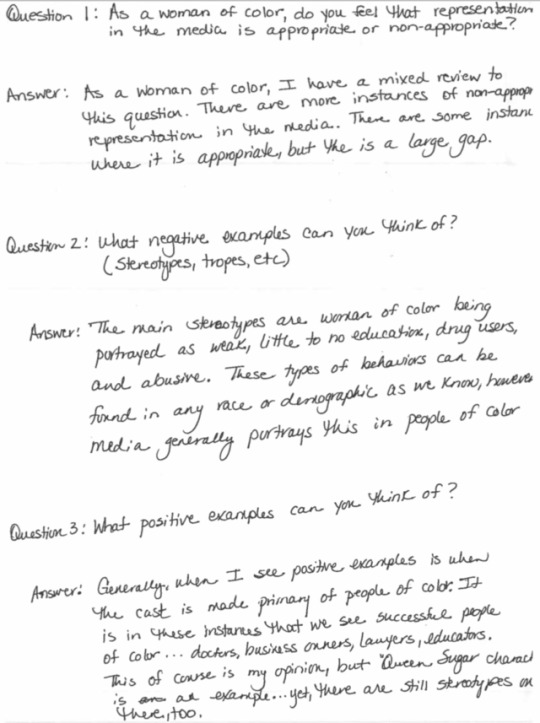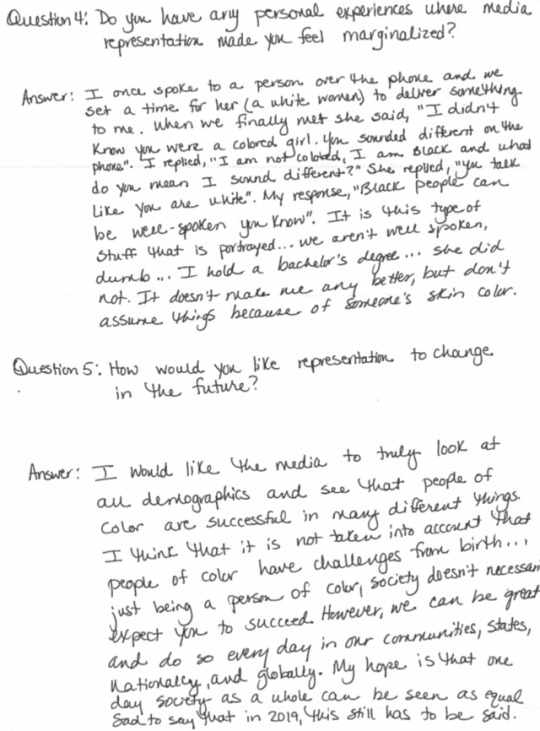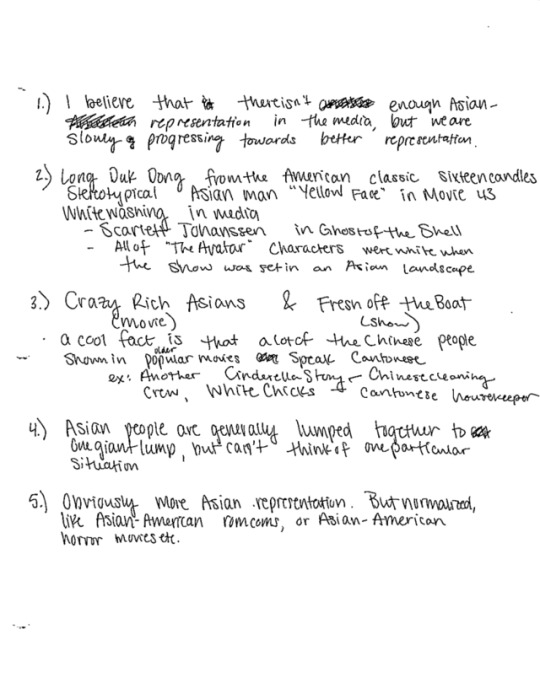Text
Reflection Piece
It was interesting and reflective to see how others respond to the question of how they are represented by the media with the knowledge I have gained in this class. Through this new lens, I feel more comfortable talking about race, gender and their roles in the media. I am also feel as though I can articulate ideas that were once foreign to me and can see that those asked to respond to our question struggle to define their ideas without the knowledge from class.
I found there to be a bit of ignorance in one of the posts proclaiming that everyone has the same platform on which to stand. As we have learned in class, this is not necessarily true. Representation for a great deal of individuals is often minimalized and stereotyped so that they do not feel a true representation of themselves in the media. This is not only sad, but psychologically harmful for so many individuals. Furthermore, we can see statistics that show the discrepancy in hired professionals in the media sphere based on race and gender.
I found the Chinese-American response to be hopeful for the future, but maybe a little too accepting of the current predicament. I believe if the respondent had learned of some of the pioneers in media that we discussed such as Sandra Oh then he may be a bit more perturbed by the current state of affairs. It was nice to see that he was hopeful for the future of Asian-American media representation.
It was interesting to hear the 21-year-old females take on white female’s representation. I found her use of pop culture to be funny, as well as accurate. Seeing how her stances could have been aided by in-depth knowledge of issue that we gained throughout this semester was inspiring because not only did she have a stance, but it mirrored a great deal of our class discussion, albeit without the theories and definitions we learned along the way.
In conclusion, I believe that I will make it a goal of mine to be a proponent of counter-narratives and minority representation in the media in my professional career. It is nice to see that there is a bit of a movement in my generation to do the same and that there is clear unrest with the current state of media. I hope to take a great many lessons from this course and apply them to my social and professional lives.
Jackson Lacy
0 notes
Text
21 year old Chinese-American
In my opinion males are well represented in the media in diverse ways. The media portrays every socioeconomic class and age when it comes to the male gender. Being well represented in the media has not really given me any true benefits but it has gotten me a lot of flack when it comes to gender issues. I can't help that I don't have the same problems as a female, I was born this way.
As an Asian-American I feel that we are being underrepresented in American media because our population is still very low in the US. In the event that we are no longer minorities in the US I would imagine that our media presence would increase also. In conclusion, as an Asian male I feel neutral for the most part when it comes to how my gender and race are represented in the media.
0 notes
Text
22 year old white male
To me, the media today seems to cast a poor light on straight white men. There is this false sense of “white privilege.” That has categorized many successful white men. For some reason, the media looks to assign every day white men’s accomplishments fiscal or otherwise as “white privilege.
In my opinion, every individual in this country has the same rights. Equal opportunity is present in all environments. The fact that the media has portrayed white men as a zealous demographic is quite concerning. Being raised as a white male in today’s society makes me worry that my children will grow up with white guilt.
0 notes
Text
19 year-old white female
1. Do you feel the media does an accurate/fair job of portraying women in the media? Why/why not?
No, I don’t feel like woman are portrayed accurately at all. We have the same capabilities and knowledge as men, yet we are constantly seen as just a body. Most women are portrayed as baseline and bland like they have no brain whatsoever. It’s frustrating to see these skinny women being idolized by young girls because it’s a complete inaccurate representation of a true woman.
2. What are some negative examples of women in the media?
Negative examples are women are the people who criticize women who gain weight. I always see or hear something about a Hollywood star who gained a little weight and the media makes it this huge deal. It’s not. People gain weight all the time and there’s absolutely nothing wrong with it. There are more important issues to be focusing on than just some actress who put on 10 pounds.
3. What are some positive examples of women in the media?
A positive example I see a lot now is women empowering other women. It’s shocking to men because women have the stereotype of being catty towards each other. I always love to see women coming together to support a common issue.
4. Do you feel like the presence of women in the media will continue to grow or shrink?
I do think the presence of women in the media will grow. Every day I hear about another woman doing something extraordinary. We are realizing our potential and are not going to stop anytime soon. It makes me excited for the future.
5. Have you ever felt personally marginalized because of your gender or age?
I have definitely felt that. I work in a hospital and as a 19 year-old people often label me as unqualified or inexperienced. They don’t know I’ve been working in a hospital for years and that I’m licensed LNA, licensed nursing assistant. A lot of people ask me how old I am whether it be a coworker or a patient I’m in charge of. The second question they ask is if I have a boyfriend which is annoying and rude. Just because I’m a working woman means I have to also have a boyfriend?
6. How would you like to see media representation of women change? Do you even want it to change?
I want to see more people talk about the glass ceiling. I was a senior in high school when I learned what that term meant. I think the media should educate young woman on real life topics and lay out the disadvantages they may face being a woman. I also think it’s so important to talk more about sexual assault.
0 notes
Text
Reflection
Based on a study for 2014-2015, researchers looked at the 12 top media outlets and found that women wrote 37% of reproductive issues stories, while men wrote 52%. When I heard this statistic I was shocked, surprised, and angry. Why are men writing more than women are writing about issues that have to do with women?
Before taking this class I knew that female presence in the media was minimal. I had heard about the wage gaps between women and men and the constant struggle it is for women to rise up in a male dominated industry. It hit me how drastic the problem was after looking at several graphs, like the reproductive issues stories, throughout the semester that visually showed me how much more men continually dominate the media scene. As a young, white woman looking to go into the media industry, it felt discouraging at first. It felt like there was no point in even trying because I was just going to be bulldozed over by every white man working alongside me. However, I shouldn’t have to feel that way. Ever. We need more women to go into the media profession because they are not being fully represented. We need more women to feel empowered and encouraged to go out into the world and report on daily issues. I want this page to feel inclusive for everyone no matter their age, gender, or race. It’s important to hear from the people around us how they perceive the media since everyone has a different opinion on the topic. It’s also important to get their opinions since they are the ones consuming the media every day. If a group does not feel like they are being represented it’s our job as media producers to change that. Our generation has the power and the knowledge to be able to go out into the media world and include everyone. America is a country filled with different people from all over the world and it is our job as media producers to be able to represent them accurately and fairly without the use of stereotypes.
Elizabeth Riddle
0 notes
Text
Response and Reflection
Earlier today, I was watching Highly Questionable on ESPN, a sports show hosted by Dan Le Batard and his father, Gonzalo Batard. Both of these men are Latino-American and to see them incorporate Hispanic language and culture in the show is inspiring to me in terms of how it portrays Latino-Americans as being capable of delivering sports news just as well as any other race. The show is on ESPN, a giant brand of sports news and these type of examples of media representation are important in exposing people to potentially unfamiliar-customs while getting the sports news they love.
Progress still needs to be made, though. This page is to show the opposite of the aforementioned case of representation in the media. The people asked are media consumers and vary in race and age. There are constant images being feed to us through our phone, tv, and computer screens. We wanted to get honest and, if need be, anonymous consumers to feel safe in talking about how media misrepresents them, appropriately represents them, made them feel small or compromised in their daily lives (marginalization, face-to-face stereotypes, etc.), and much more. We also felt that the opportunity for media consumers to have their voices heard in the processes of change. This gesture is a most relevant way in exposing what’s wrong through the eyes of those who have actually felt the effects - not some study or statistic. Studies and statistics are important, but we are proud of the “organic” feel and responses and hope this is articulated in real life conversation and, therefore, change.
André
0 notes
Text
21 year old white female
As a white female in the 21st century, I believe media has had a positive shift in how they portray white females. Before, men were portrayed as the higher power and had the control over most media. Now, there are many powerful women who are influencers, news anchors, talk show hosts, and authors. Although most women in tv shows and movies are shown as white, other races and ethnicities have started to play large roles in these shows and movies. Women are starting to stand up for each other and not put up with the belittling of a gender or race.
Although women have started to take a stand, I have noticed there are very many shows and stories out there about white women who are viewed as rude or ungracious, such as the Housewives Series. This belittles the women because media tries to pick out and piece together the most dramatic points of a clip and make situations seem worse than they really are. Another bias media has is blaming women for erratic behavior or hormonal off-balance. They like to show this behavior in women because it makes for a better story and if someone doesn’t agree with what the women says, they can just blame the women’s attitude and say she’s crazy. This mostly happens to white females because there is a stereotype that every white woman should respect men and be quiet when in reality they should speak up if something is wrong. The last way media degrades white women is they promote thinness and culture standards. There are many dieting advertisements, public figures that sell “detox teas”, and ways media degrades women for not looking the way men would want them to.
0 notes


